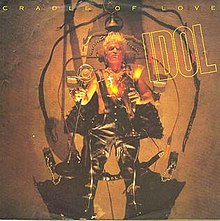
Charmed Life is the fourth studio album by English rock singer Billy Idol, released on 30 April 1990 by Chrysalis Records.

"Cat's in the Cradle" is a folk rock song by American singer-songwriter Harry Chapin, from his fourth studio album, Verities & Balderdash (1974). The single topped the US Billboard Hot 100 in December 1974. As Chapin's only number-one song, it became the best known of his work and a staple for folk rock music. Chapin's recording of the song was nominated for the 1975 Grammy Award for Best Male Pop Vocal Performance and was inducted into the Grammy Hall of Fame in 2011.
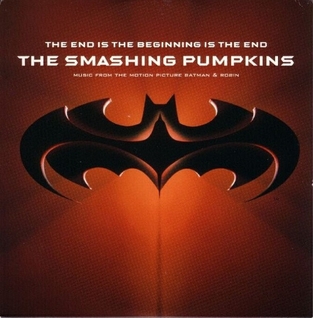
"The End Is the Beginning Is the End" is a song by the American alternative rock band the Smashing Pumpkins. Originally released as a single from the soundtrack to the film Batman & Robin (1997), it was their first release with drummer Matt Walker, who would go on to contribute percussion to several tracks of Adore and all of James Iha's Let It Come Down. The song reached the top 10 in eight countries and won the Grammy Award for Best Hard Rock Performance.

"Lovesong" is a song by English rock band the Cure, released as the third single from their eighth studio album, Disintegration (1989), on 21 August 1989. The song saw considerable success in the United States, where it reached the number-two position in October 1989 and became the band's only top-10 entry on the Billboard Hot 100. In the United Kingdom, the single charted at number 18, and it peaked within the top 20 in Canada and Ireland.

"White Wedding" is a song by Billy Idol that was released as the second single from his self-titled studio album in 1982. Although not Idol's highest-charting hit, it is often considered one of his most recognizable songs. In the US, it peaked at No. 10 on the Billboard Bubbling Under the Hot 100 chart on 27 November 1982, then reached No. 36 on the Billboard Hot 100 on 2 July 1983 after it was re-issued. In the UK, it reached No. 6 in the UK Singles Chart upon its re-release there in 1985, when it was re-issued to promote the Vital Idol remix album.

Billy Idol is the debut studio album by English rock singer Billy Idol, released on 16 July 1982 by Chrysalis Records. After the breakup of the band Generation X and the release of his first solo extended play, Don't Stop (1981), Idol began working on his debut album. Produced by Keith Forsey, Billy Idol is a rock album with strong influences of new wave music.

"Malibu" is a song by American alternative rock band Hole. It is the fourth track and second single from the band's third studio album, Celebrity Skin, and was released in December 1998, on DGC Records. The song was written by vocalist and rhythm guitarist Courtney Love, lead guitarist Eric Erlandson and Billy Corgan of the Smashing Pumpkins, who contributed to four other songs on Celebrity Skin.
"Don't Know Much" is a song written by Barry Mann, Cynthia Weil and Tom Snow. Mann was the first to record the song in 1980, gaining a minor chart hit in the US. The song was made famous when it was covered as a duet by Linda Ronstadt and Aaron Neville in 1989. Their version was a worldwide success, topping the Irish Singles Chart and reaching the top 10 in several territories.
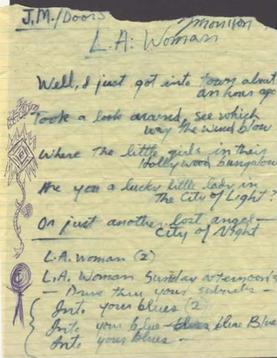
"L.A. Woman" is a song by the American rock band the Doors. The song is the title track of their 1971 album L.A. Woman, the final album to feature Jim Morrison before his death on July 3, 1971. In 2014, LA Weekly named it the all-time best song written about the city of Los Angeles.

"Love Will Lead You Back" is a song recorded by American singer Taylor Dayne for her second studio album, Can't Fight Fate (1989). Written by Diane Warren and produced by Ric Wake, the song was released on January 12, 1990, by Arista Records as the second single from the album.

"Hold On" is a song by American vocal group Wilson Phillips, released on February 27, 1990 by SBK, as the lead single from their debut studio album, Wilson Phillips (1990). The song topped the US Billboard Hot 100 for a week in June 1990 and was the most successful single of that year in the US. It also became a worldwide hit, peaking within the top three in Australia and Canada and the top 10 in Belgium, Ireland, New Zealand, Sweden, and the United Kingdom. The song received platinum sales certifications in Australia and the UK and a gold certification in the US. Julien Temple directed its music video.

"All I Wanna Do Is Make Love to You" is a song by American rock band Heart. It was composed by veteran songwriter and producer Robert John "Mutt" Lange and released as the lead single from the band's tenth studio album, Brigade, in March 1990. The song was first recorded as "All I Want to Do Is Make Love to You" by Dobie Gray in 1979, though with different lyrics. The Heart version tells the story of a woman who sets out to seduce a hitchhiker in order to become pregnant because although there is a man in her life, he is infertile.
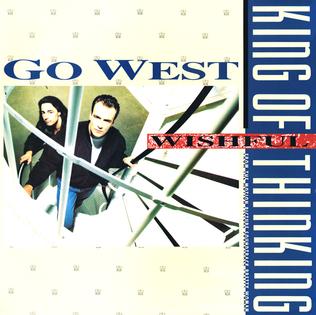
"King of Wishful Thinking" is a song by British pop duo Go West, written by Peter Cox, Richard Drummie and Martin Page. It was featured in the film Pretty Woman and appeared on its soundtrack. It was later featured on Go West's third studio album, Indian Summer, in 1992.

This is the discography of American singer-songwriter Billy Joel. He has released 13 studio albums, seven live albums, 18 compilation albums, 10 video albums, 82 singles, three promotional singles and 45 music videos. Throughout his career, he has sold over 150 million records worldwide, making him one of the best-selling music artists in history. According to Recording Industry Association of America, Joel has sold 85 million certified albums in the United States, making him the 4th best-selling solo artist of all time. Billboard ranked him as the 9th Greatest male soloist of all time.

"Mony Mony" is a 1968 single by American pop rock band Tommy James and the Shondells, which reached No. 1 on the UK Singles Chart and No. 3 in the U.S. Written by Bobby Bloom, Ritchie Cordell, Bo Gentry, and Tommy James, the song has appeared in various film and television works such as the Oliver Stone drama Heaven & Earth. It was also covered by English singer-songwriter Billy Idol in 1981. Idol's version, which took in more of a rock sound, became an international top 40 hit and additionally revived public interest in the original garage rock single. Idol recorded a live version in 1985 which was ultimately released in 1987 where it became an even bigger hit than the Shondells 1968 original, reaching No. 1 on the Billboard Hot 100.

"I Go to Extremes" is a song by American singer Billy Joel from his eleventh studio album, Storm Front (1989), released as the album's second US single in early 1990. It reached the number-six position on the US Billboard Hot 100 and peaked at number three on the Canadian RPM 100 Hit Tracks chart. The song was also a top-10 hit on both the Billboard Adult Contemporary and Album Rock Tracks charts. The song also reached at number 70 on the UK Singles Chart.

William Michael Albert Broad, known professionally as Billy Idol, is an English-American singer, songwriter, musician and actor. He first achieved fame in the 1970s emerging from the London punk rock scene as the lead singer of the group Generation X. Subsequently, he embarked on a solo career which led to international recognition and made Idol a lead artist during the MTV-driven "Second British Invasion" in the US. The name "Billy Idol" was inspired by a schoolteacher's description of him as "idle".
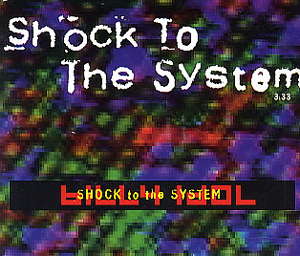
"Shock to the System" is a single by English musician Billy Idol, released to promote his fifth album, Cyberpunk (1993). Released in June 1993 by Chrysalis Records, it became a top-40 hit in six countries, including Idol's native United Kingdom, but did not make it onto the US Billboard Hot 100.

The discography of Billy Idol, his solo recordings post-Generation X, consists of seven studio albums, one live album, seven compilation albums, three extended plays, and 37 singles.

"Sweet Sixteen" is a song by British singer-songwriter Billy Idol, released in 1987 as the third single from his third studio album Whiplash Smile (1986). The song written by Idol and produced by Keith Forsey. "Sweet Sixteen" peaked at No. 20 in the US and No. 17 in the UK. It was also a hit across Europe and beyond.
